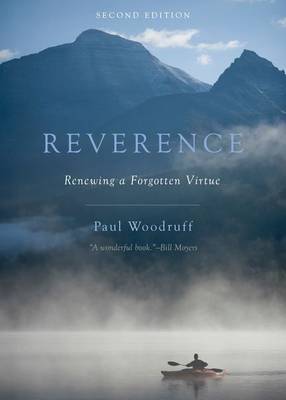
- Afhalen na 1 uur in een winkel met voorraad
- Gratis thuislevering in België vanaf € 30
- Ruim aanbod met 7 miljoen producten
- Afhalen na 1 uur in een winkel met voorraad
- Gratis thuislevering in België vanaf € 30
- Ruim aanbod met 7 miljoen producten
Zoeken
Omschrijving
Reverence is an ancient virtue that survives among us in half-forgotten patterns of civility and moments of inarticulate awe. Reverence gives meaning to much that we do, yet the word has almost passed out of our vocabulary. Reverence, says philosopher and classicist Paul Woodruff, begins in an understanding of human limitations. From this grows the capacity to be in awe of whatever we believe lies outside our control -- God, truth, justice, nature, even death. It is a quality of character that is especially important in leadership and in teaching, although it figures in virtually every human relationship. It transcends religious boundaries and can be found outside religion altogether. Woodruff draws on thinking about this lost virtue in ancient Greek and Chinese traditions and applies lessons from these highly reverent cultures to today's world. The book covers reverence in a variety of contexts -- the arts, leadership, teaching, warfare, and the home -- and shows how essential a quality it is to a well-functioning society. First published by Oxford University Press in 2001, this new edition of Reverence is revised and expanded. It contains a foreword by Betty Sue Flowers, Distinguished Teaching Professor Emeritus at the University of Texas at Austin, a new preface, two new chapters -- one on the sacred and one on compassion -- and an epilogue focused on renewing reverence in our own lives.
Specificaties
Betrokkenen
- Auteur(s):
- Uitgeverij:
Inhoud
- Aantal bladzijden:
- 336
- Taal:
- Engels
Eigenschappen
- Productcode (EAN):
- 9780199350803
- Verschijningsdatum:
- 2/06/2014
- Uitvoering:
- Paperback
- Formaat:
- Trade paperback (VS)
- Afmetingen:
- 128 mm x 179 mm
- Gewicht:
- 272 g

Alleen bij Standaard Boekhandel
+ 36 punten op je klantenkaart van Standaard Boekhandel
Beoordelingen
We publiceren alleen reviews die voldoen aan de voorwaarden voor reviews. Bekijk onze voorwaarden voor reviews.











